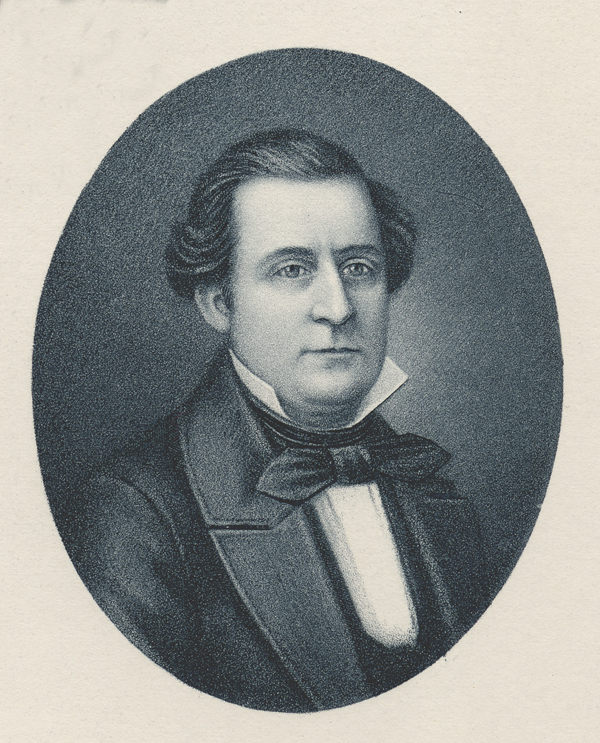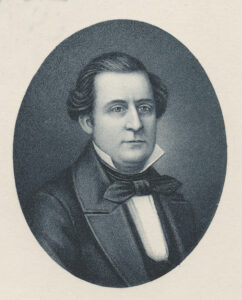Robert Charles Wickliffe
Democrat Robert Wickliffe, who served as the governor of Louisiana from 1856 until 1860, oversaw the state in the increasingly tumultuous years before the Civil War.

Courtesy of Louisiana State Museum
Governor Robert Wickliffe. Unidentified
Democrat Robert Wickliffe, who served as the governor of Louisiana from 1856 until 1860, oversaw the state in the increasingly tumultuous years before the Civil War (1861-1865). Though he initially opposed secession, Wickliffe advocated both slavery and state’s rights and gradually reversed his position when it became clear that regional reconciliation was unlikely. During his term in office, Wickliffe also battled with members of the “Know Nothing” party—a political movement that developed in response to fears that non-Anglo-Saxon immigrants were overwhelming the United States—who dominated New Orleans politics at the time.
As governor, Wickliffe directed much of his attention to the defense of Southern rights and slavery. As a precautionary measure, he advocated the removal of free people of color in Louisiana to prevent them from influencing slaves. In his last message to the legislature, Wickliffe argued that the “fanatics” of the North must be beaten back and that the state should reorganize its militia forces for its own protection and to stand with other Southern states in protecting “our constitutional rights.” The Panic of 1857, which also occurred during Wickliffe’s term, added economic worries to Louisiana’s political turmoil.
Born in Bardstown, Kentucky, on January 6, 1819, Robert Charles Wickliffe was the son of Charles A. Wickliffe and Margaret Cripps Wickliffe. He studied at various Kentucky schools before graduating from Centre College in Danville in 1840. After President John Tyler appointed Charles Wickliffe, a former governor of Kentucky, to U.S. Postmaster General in 1841, the Wickliffes moved to Washington, D.C., where Robert studied law with U.S. Attorney General Hugh Legare. In 1843 he married Anna Dawson, the daughter of Louisiana congressman John Bennett Dawson and the niece of Louisiana governor, Isaac Johnson. After living in Bardstown for a brief period, the couple moved to St. Francisville, Louisiana, in 1846, hoping that Robert Wickliffe’s health would improve.
In St. Francisville, Wickliffe helped manage a cotton plantation and continued practicing law on a limited basis. In 1851, West Feliciana Parish voters elected him to the Louisiana State Senate. After being reelected to that office twice without opposition, Wickliffe was elected president of the senate by his colleagues. Louisiana Democrats found him a particularly effective campaigner against the Know Nothing Party and selected him as their candidate for governor in 1855. Wickliffe defeated Charles Derbigny, a Know Nothing, by approximately three thousand votes.
At the end of his term in 1860, Wickliffe returned to planting and practicing law. He also served as a delegate for presidential candidate Stephen A. Douglas at the 1860 Democratic National Convention. After the Civil War, voters elected Wickliffe to the U.S. Congress, but he was denied admission when he refused to take an oath indicating that he had never borne arms against the Union and/or supported the Confederacy.
In 1870, after the death of his first wife, Wickliffe married his cousin, Arnie (Davis) Anderson and continued his political involvement. In 1876 he was an elector-at-large for Samuel J. Tilden, the Democratic candidate for president. Wickliffe ran for the office of lieutenant governor of Louisiana in 1892 with gubernatorial candidate John McEnery, but returned to his law practice after losing the election. He died on April 18, 1895, while visiting relatives in Bardstown.
Adapted from William H. Adams’s entry for the Dictionary of Louisiana Biography, a publication of the Louisiana Historical Association in cooperation with the Center for Louisiana Studies at the University of Louisiana, Lafayette. http://www.lahistory.org
Sources: Dictionary of American Biography, XX; Edwin Davis, The Story of Louisiana, I (1960).
